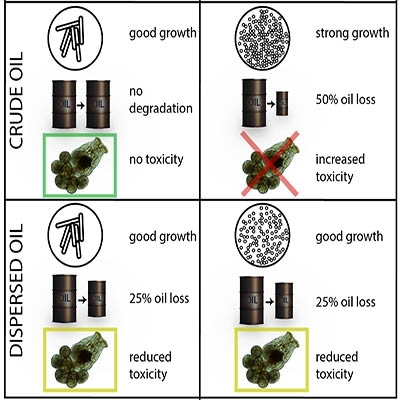
Hydrocarbon Degrading Bacteria Exhibit a Species Specific Response to Dispersed Oil while Moderating Ecotoxicity
The Deepwater Horizon blowout in April, 2010, represented the largest accidental marine oil spill and the largest release of chemical dispersants into the environment. While dispersant application may provide numerous benefits to oil spill response efforts, the impacts of dispersants and potential synergistic effects with crude oil on individual hydrocarbon degrading bacteria are poorly understood. In this study, two environmentally relevant species of hydrocarbon degrading bacteria were utilized to quantify the response to Macondo crude oil and COREXIT® 9500A dispersed oil in terms of bacterial growth and oil degradation potential. Furthermore, specific hydrocarbon compounds were quantified in the dissolved phase of the medium and linked to ecotoxicity using an EPA-approved rotifer assay. Bacterial treatment significantly and drastically reduced the toxicity associated with dispersed oil (increasing the LC50 by 215%). Growth and crude oil degradation potential of Acinetobacter were inhibited by COREXIT 34% and 40%, respectively; conversely, COREXIT significantly enhanced the growth of Alcanivorax by 10% relative to un-dispersed oil. Furthermore, both bacterial strains were shown to grow with COREXIT as the sole carbon and energy source. Hydrocarbon-degrading bacterial species demonstrate a unique response to dispersed oil as compared to crude oil, with potentially opposing impacts on toxicity. While some species have the potential to enhance the toxicity of crude oil by producing biosurfactants, these same bacteria may reduce the toxicity associated with dispersed oil through degradation or sequestration.


